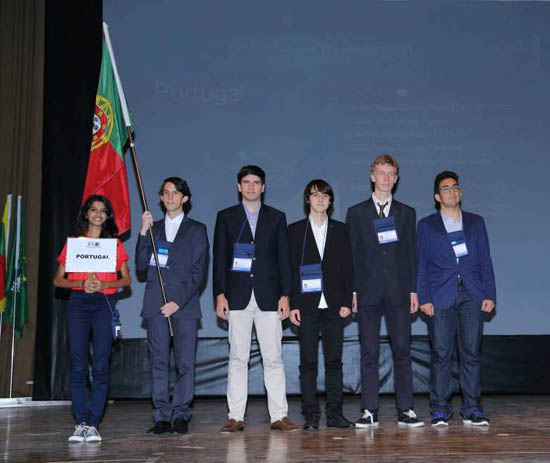
Student Grégory François Xavier Leatitia Marie Ghislain Bonaert, from the Julio Dantas School Group, in Lagos, won a bronze medal at the International Physics Olympics, which ended today, July 12, in Mumbai (Bombay), India.
The student from Lagos was the highest ranked student in the Portuguese team, which, in addition to his bronze medal, also received three honorable mentions in one of the most extensive tests of the International Physics Olympiads in memory.
382 high school final year students from 82 countries participated in this competition.
This Olympics, which is already in its XLVI edition, is an annual competition where young pre-university students are invited to demonstrate their preparation in Physics in two long and difficult exams (one theoretical and one experimental).
The level of knowledge required to take these tests goes far beyond the Physics program of secondary education, involving immense effort and dedication on the part of the students during the preparation phase.
The absolute winner of this Olympiad, who got the best classification in both tests, was a student from South Korea, Taehyoung Kim.
Although unusual, this year the theoretical problems focused mainly on topics of Nuclear and Particle Physics.
The students answered complex questions about radiation and particles resulting from nuclear fusion that takes place in the Sun and also about the wave properties of matter. In the last question, the national team solved a problem about the details of the operation of a nuclear reactor.
The team-leaders who accompanied the delegation to Mumbai, Fernando Nogueira and Rui Travasso, made a very positive assessment of the Portuguese performance: «the overall performance of our students was very good, with a clear improvement in the results of the theoretical component of the national team when compared to recent years.”
The professors of the Faculty of Science and Technology of the University of Coimbra (FCTUC) point out that «the themes of the theoretical exam questions demanded a lot of ease with topics in Physics that the students were only exposed to in the short process of preparation for these Olympics . The experimental test was very long and complex, and it was necessary to have great experimental dexterity to be able to collect and analyze all the data in good time.”
This test was based “on the experience carried out by Rosalind Franklin, which resulted in the discovery of the structure of DNA and the Nobel Prize in 1962. It was the hard work of preparing students throughout the year, individually, in their schools, and in the sessions of took place at the University of Coimbra, which was highlighted here with these excellent results. The teachers of these students also played an extremely important role, since the experimental preparation was done with them, in schools and outside normal hours», they stress.
The «very deficient experimental component of the programs taught in our teaching makes the preparation work enormously difficult, requiring a lot of effort on the part of the students to compensate for their discomfort in a Physics laboratory», conclude the FCTUC teachers.
The Physics Olympics are an activity promoted by the Portuguese Society of Physics with the sponsorship of the Ministry of Education and Science, the Ciência Viva Agency, the EDP Foundation and the Calouste Gulbenkian Foundation. The team's training took place at the Physics Department of the Faculty of Science and Technology of the University of Coimbra, as part of the activities of the Quark school! of Physics for young people.
List of Portuguese students is as follows:
Grégory François Xavier Leatitia Marie Ghislain Bonaert (Júlio Dantas School Grouping, Lagos) – bronze medal
André Miguel Gomes Pereira Lello de Almeida (Colégio Luso-Francês, Porto) – honorable mention
José Guilherme Boura de Matos (Mirandela Secondary School) – honorable mention
João Carlos Lourenço Antunes (Amadora Secondary School) – honorable mention
David José Simões Pereira (Lima-de-Faria Secondary School, Cantanhede).


















Comments